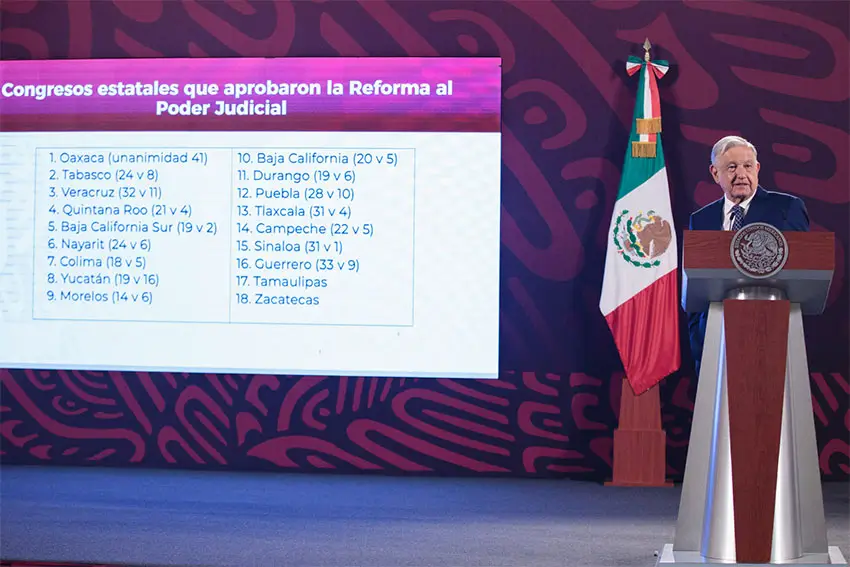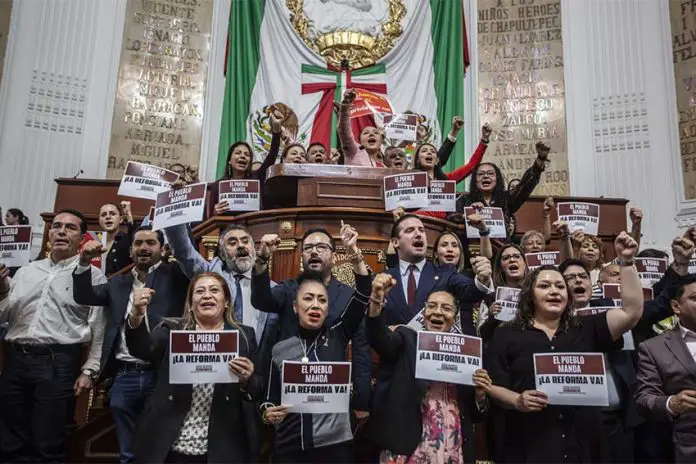Only 24 hours after the Mexican Senate passed a controversial judicial reform bill, 18 state legislatures had already ratified the constitutional reform, opening the door for the sweeping reform to become the law of the land.
During his Thursday morning press conference, President Andrés Manuel López Obrador told reporters that he hoped to publish the bill on Sept. 15, the same day Mexico commences its annual Independence Day celebrations.

“This is a very important reform,” López Obrador said, according to El Economista. “This reaffirms Mexico as an authentic democracy, … that the people elect its public servants within all three branches of government. This is democracy, not the elites, not the so-called political class, not the oligarchy.”
As a constitutional reform, the bill — championed by López Obrador, the ruling Morena party and its allies — required the ratification of at least 17 state congresses to become law.
During a raucous marathon session that started Tuesday, protesters invaded the Senate floor and forced lawmakers to find an alternate venue. The debate finally continued with Morena leaders allegedly strong-arming a pair of opposition senators to support the bill, allowing it to pass with a supermajority (86-41) before dawn on Wednesday.
The bill immediately went to the states for consideration, and, within a matter of hours, 11 state legislatures had ratified the reform. With Morena controlling 24 state congresses, ratification was nearly a foregone conclusion.
Morena’s leader in the lower house, Ricardo Monreal, said on Thursday he would convene a special session before the weekend to recognize the state legislatures’ ratification and declare the reform to be constitutionally approved. Such quick action could allow López Obrador to sign the reform into law just hours before the Independence Day celebrations begin in Mexico City’s Zócalo.
The next step after signing it into law would see the Chamber of Deputies — which approved the judicial reform on Sept. 4 — draft the secondary laws needed to implement the reform.

Businesses and investors inside and outside Mexico will watch that legislative process closely, particularly regarding judicial review powers and the qualifications required of judicial candidates.
Depending on how the secondary laws are written, they could strip businesses and individuals of the right to appeal government rulings in civil courts.
If the courts’ right to judicial review is curtailed — as proponents of the bill have suggested — the Supreme Court will no longer review executive orders. The sitting president and Congress can do “anything they want” without those checks and balances, Tony Payan, director of the Center for the U.S. and Mexico at Houston’s Rice University, told KTSM News in El Paso, Texas.
“The most troubling issue is the judiciary no longer being able to check administrative decisions,” Payan said.
As for concerns about the qualifications required of judicial candidates, Bloomberg News reported that the “possible politicization” of judicial appointments “would open the door for judges to face external pressures” that could compromise the courts’ independence and impartiality.
Bloomberg also warned of a potential a domino effect — with new FDI slowing down due to low investor confidence, and Mexico losing its investment grade, affecting its ability to obtain new financing.
Entrepreneurs in Mexico, the United States and other industrialized nations are already pausing future investments or considering moving operations elsewhere, KTSM News reported.
The Texas Public Policy Foundation responded quickly to the passage of the constitutional amendment, claiming in a post on social media that Texas is a more stable alternative for businesses engaged in international trade:
“Texas is ready to welcome investment dollars that may be looking for a new home as a result of uncertainty surrounding Mexico’s radical judicial reform. We offer a stable and business-friendly environment for global investors that doesn’t change radically. We respect businesses.”
With reports from El Economista, KTSM News, Bloomberg News and Milenio
